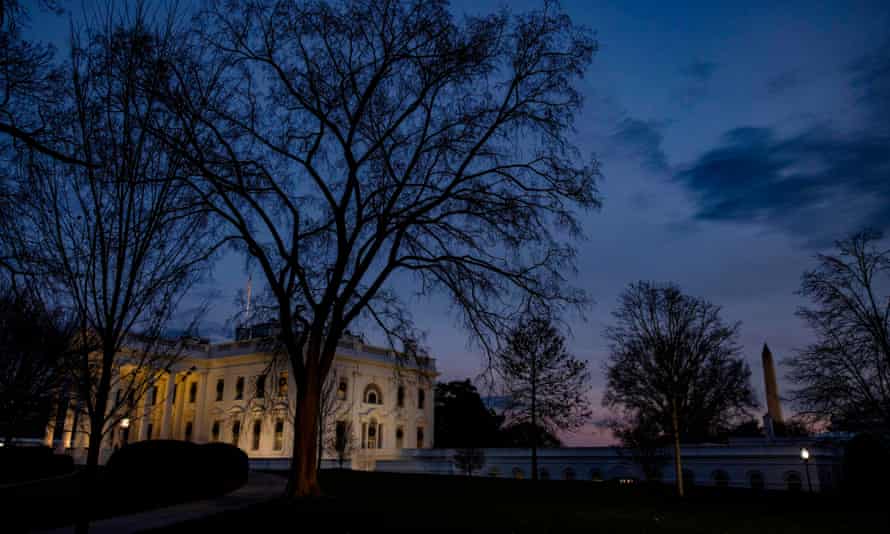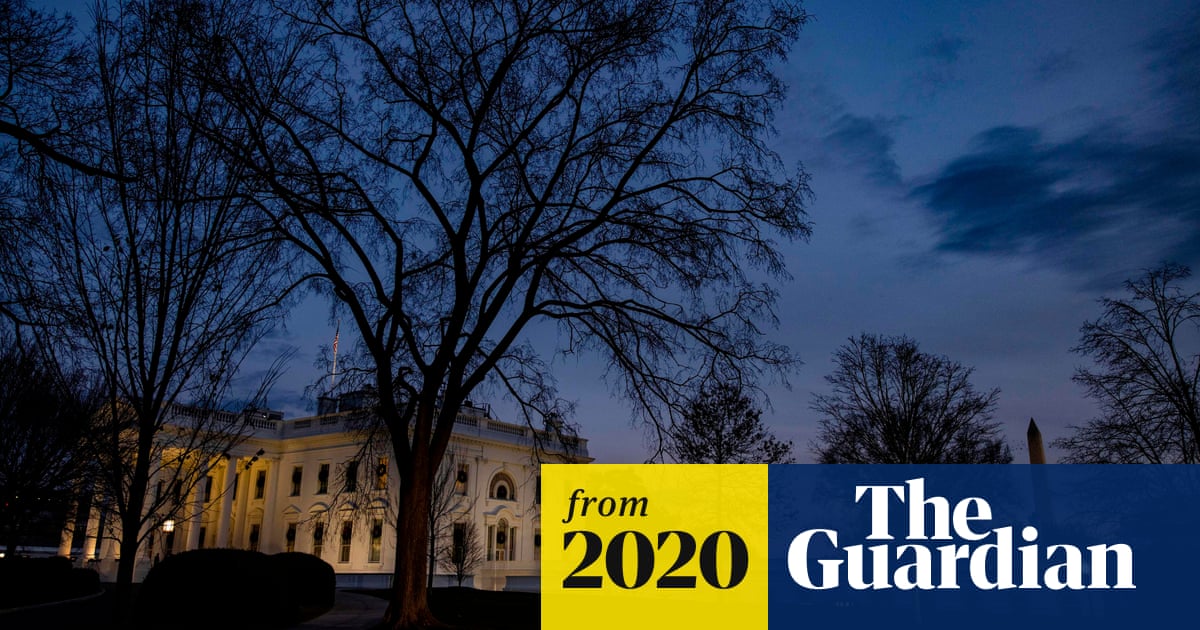Senior Republican says Trump's final election challenge will ‘go down like a shot dog’
Trump continues to make baseless claims of mass electoral fraud, and has reportedly attacked both McConnell and Pence
Dusk falls over the White House in Washington DC on Monday. Photograph: Samuel Corum/AFP/Getty Images
Donald Trump has reportedly acknowledged in private that his attempt to overturn the election result will fail, while a senior Republican in the Senate said on Monday a challenge coming in the
House of Representatives will “go down like a shot dog”.
But amid reports of a president unhinged – one
report said: “We cannot stress enough how unnerved Trump officials are” – and while Trump continued to stoke a Republican civil war by attacking Mitch McConnell, the Senate majority leader, a group of GOP representatives visited the White House to plan one final push to reverse the will of the American people.
Congress meets
to validate the electoral college result, a 306-232 win for Joe Biden, on 6 January. On Monday, Representative Mo Brooks of Alabama led a delegation of about 12 Republicans to the White House, where they discussed how their challenge to that result will proceed.
“It was a back and forth concerning the planning and strategy for January the 6th,” Brooks told
Politico, adding:
“More and more congressmen and senators are being persuaded that the election was stolen.”
There is no evidence that this is the case, and Brooks notably declined to identify any of the supposed doubters. By all the evidence, challenges to the result in the House and the Senate will not have the votes to be sustained.
On Monday, No 2 Republican senator John Thune
told CNN the move was “going down like a shot dog” and added: “I just don’t think it makes a lot of sense to put everybody through this when you know what the ultimate outcome is going to be.”
Nonetheless, Trump continues to make baseless accusations of mass electoral fraud and reportedly to rage against aides he deems insufficiently zealous in his defence. According to
the news site Axios, White House counsel Pat Cipollone and chief of staff Mark Meadows are prominent among such hapless targets.
So is McConnell, whom Trump claims to have saved in his re-election fight this year, the president
sending a slide to Republicans in Congress which purported to show the restorative effect of a presidential tweet and robocall.
“Sadly, Mitch forgot,” the slide said. “He was the first one off the ship!”
The wisdom or otherwise of attacking the Republican Senate leader two weeks before run-off elections in Georgia that will decide control of the chamber, and with it much of Biden’s chances of legislative success, seems lost on the president for now.
Meadows was once a member of the hard-right Freedom Caucus in the House, and his former allies were among those visiting the White House on Monday. One was Jim Jordan of Ohio, a renowned attack dog so loyal to Trump that
he has claimed never to have heard the president lie. (The Washington Post’s
count of Trump’s lies in office stands at 26,000.) Also there was Marjorie Taylor Greene of Georgia, an
open supporter of the far-right QAnon conspiracy theory preparing to take a seat in Congress.
Mike Pence, who will preside over the joint session of Congress on 6 January, also attended the meeting.
Trump is even reported to have soured on the vice-president, his loyal lieutenant since joining the ticket in 2016. The president is reported to believe Pence is “
backing away” from him – notably, a claim advanced in a recent ad by the Lincoln Project, a group of dissident Republicans.
“When Mike Pence is running away from you,” the ad says, “you know it’s over.”
The Lincoln Project ad.
Brooks said the
Republicans were “trying to make sure that we understand what [Pence’s] view of the procedural requirements are, so we can comply with them. Pence will have a tremendous amount of discretion, though I think the rulings he will make will be pretty cut and dry.
“It’s still somewhat fluid, since this does not happen very often.”
Trump remains actively engaged in the fundamentally anti-democratic campaign. He is said to have spent an hour poring over the details of the 6 January session with the group from Congress.
The closer the president gets to removal from office, the more volatile he becomes, and the more wild his invective grows. According to Olivia Nuzzi of
New York magazine, since election day White House aides have been “outright avoiding the president out of concern he might end up using any nearby staffer as a human stress ball”.
In a meeting at the White House last Friday, Trump is
reported to have floated the idea of the arch-conspiracy theorist and lawyer Sidney Powell being appointed a special counsel to investigate voter fraud during the election.
According to the New York Times, Trump asked advisers at that gathering about whether the military could be mobilised to “rerun” the election. The idea was the brainchild of Michael Flynn, a former national security adviser pardoned by Trump for lying to the FBI, who was present at the Friday meeting.
As Trump digs himself ever further into his “stolen election” rabbit hole, other key figures in his administration are gently but firmly moving in the other direction. William Barr, the US attorney general who has been
willing to accommodate many of Trump’s whims, has distanced himself.
On Monday Barr
bluntly squashed the idea of a special counsel.
“If I thought a special counsel at this stage was the right tool, I would name one, but I haven’t and I’m not going to,” he said.
Trump continues to make baseless claims of mass electoral fraud, and has reportedly attacked both McConnell and Pence

www.theguardian.com
No. 2 GOP senator: Efforts to overturn election would 'go down like a shot dog'
By
Jordain Carney - 12/21/20 11:22 PM EST
2,166
Sen.
John Thune (S.D.), the No. 2 Senate Republican, warned on Monday that efforts to challenge the Electoral College vote in Congress next month would fall short in the Senate.
The GOP senator — who has publicly and privately pushed back against the effort being led by Rep.
Mo Brooks (R-Ala.) — argued that it would be futile to force both chambers to vote on an objection to the Electoral College vote that is "not going anywhere."
"I mean, in the Senate, it would ... go down like a shot dog," Thune told reporters. "I just don't think it makes a lot of sense to put everybody through this when you know what the ultimate outcome is going to be."
His comments come after a group of House conservatives met with
President Trump and Vice President Pence
on Monday at the White House to strategize on the effort to challenge the Electoral College votes when Congress formally convenes to count and certify the votes next month.
"Big meeting today with @realDonaldTrump, @VP, the President's legal team,
@freedomcaucus and other Members of Congress. I will lead an objection to Georgia's electors on Jan 6. The courts refuse to hear the President's legal case. We're going to make sure the People can!" Rep.
Jody Hice (R-Ga.)
tweeted about the meeting.
Brooks has said he's spoken with Senate Republicans who are receptive to his plan, though none have said they plan to object. Sen.-elect Tommy Tuberville (R-Ala.) has said he's considering it, something that earned him public praise from Trump. A group of 2024 hopefuls is also being watched closely.
Thune said on Monday that he didn't know of a GOP senator, or an incoming GOP senator, who had committed to challenging the election results on Jan. 6.
"I don't know where they're getting that. I've seen public statements from a couple of Republicans, incoming Republicans, but I don't know that anyone is committed to doing it," he said when a reporter noted that House Republicans claim that a senator supports their effort.
The push by Brooks and others to use Congress's vote to prolong the election fight has put a spotlight on divisions between House and Senate Republicans, who have made it clear they are ready to move on.
Thune, Senate Majority Leader
Mitch McConnell (R-Ky.) and Sen.
Roy Blunt (R-Mo.), a member of GOP leadership and the Senate Rules Committee chairman, used a private caucus call
last week to warn members of the caucus against challenging the results on Jan. 6.
Several House Republicans have said they are backing Brooks's effort, but to successfully force a debate and vote on his objection, he’ll need support from at least one GOP senator. That’s only happened twice since 1887, according to the Congressional Research Service.
If both a House member and a senator object, the two chambers would have to meet separately, debate the issue and then have a majority in both chambers vote to uphold the objection to a state’s slate. A lawmaker has never been able to successfully throw out a state's results.
Sen. John Thune (S.D.), the No. 2 Senate Republican, warned on Monday that efforts to challenge the Electoral College vote in Congress next month would fall short in the Senate.The GOP senator — wh…

thehill.com



 www.rt.com
www.rt.com










